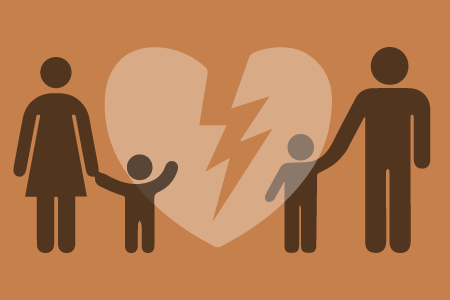How divorce truly affects children

One of every two marriages now ends in divorce. As a doctor of marriage and family therapy, you will work with couples in many phases of their relationship. Some may have marital troubles but do not wish to get divorced, some may include one spouse in favor of divorce and one against it and some accept together that divorce may be their best option.
Many couples’ main concern is how their divorce will affect their children.
Scientists continue to study this subject, with many opposing conclusions. It’s clear that parental divorce causes high stress levels in children, but every case is unique. How a child takes divorce can vary their pre-existing mental state, their age, their relationship with their parents, the kind of relationship their parents had and how messy the divorce gets.
“It’s not so much the fact of parental separation, it’s the conflict,” said Jo Edwards, director of Resolution, a UK organization focused on family law (via. Yahoo Parenting). It’s important that parents do not put their children in the middle of the divorce or try to turn children against the other parent.
If children experience drastic effects of divorce and seek help from a doctor of marriage and family therapy, they are most commonly:
Difficulty in School
Parental divorce is tied to lower test scores and difficulty concentrating at school. Children of divorce are also more likely to drop out of school than students with married parents. This is something that students may discuss with their school counselor, but that parents may bring their child to a marriage and family counselor for, as well.
Experimentation with Drugs or Alcohol
With stress and confusion over their parents’ divorce, some children turn to drugs and alcohol to deal, or not deal, with their feelings.
Eating Disorders
Divorce rates have been tied to eating disorders in children. Some children will develop anorexia or bulimia, while others binge on food. You may notice a drastic weight loss or gain. At times, you will see children's’ eating habits change without being so severe to add the label of “disorder.”
Reverting
Younger children especially may revert back to habits from infancy as an effect of their parents’ divorce. You may find that a toddler is having more accidents or sucking their thumb more often.
Choosing Sides
Many children feel that someone needs to be at fault for the divorce, so they will choose one parent to side with and one parent to alienate.
Anxiety, Guilt or Depression
Other times, children believe that the person to blame for the divorce is them. They may suffer with feelings of anxiety, guilt or depression and punish themselves for playing a part in their parents’ divorce.
Physical Illness
It’s not just mental health you need to keep in mind when dealing with divorce, but physical as well. Children living with a high amount of stress may develop stomach issues or report more headaches.
Anger
Anger is a very common emotion in children of divorce. They may lash out at not just their parents, but teachers, friends, classmates and other family members as well.
There is some good news when it comes to children and divorce. Children living in a household with domestic violence or emotional or physical abuse typically do better following a divorce and removal from constant trauma than they would have if their parents remained married.
If you would like to help families work through their issues, reach out to one of our admissions counselors to find out more about how to earn your doctor of marriage and family therapy.







